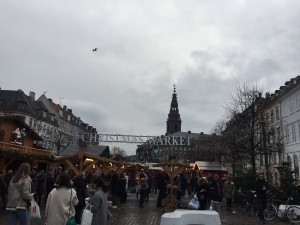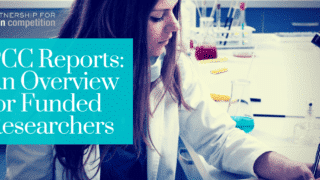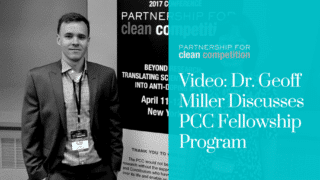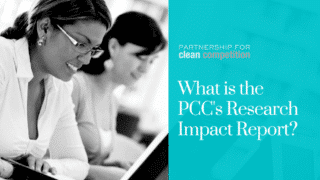PhD Anti-Doping Course Highlights
Two weeks ago, PhD researchers from around the world gathered in Denmark to take advantage of a free course designed to expand participant’s knowledge of anti-doping science. The course, led by global experts, was organized by the Department of Nutrition, Exercise and Sports (NEXS) at the University of Copenhagen and supported in part by the Partnership for Clean Competition.
Lectures were led by top scientists and researchers, including course organizers Nikolai B. Nordsborg, Carsten Lundby & Lars Nybo, and PCC Scientific Advisory Board member Dr. Mike Sawka. Topics ranged from volume boosting & performance to the Athlete Biological Passport, with opportunities for student led experiments, discussions, and interaction.
We followed Louisa Lobigs, recipient of a PCC travel grant, to attend the course, as she took part in the course offerings. Her correspondence offers excellent insight into the program, which the organizers hope to offer again in 2019.
Monday:
Today we were discussing Hb mass testing using the CO-rebreathing method, water balance and hydration, and finished with altitude and autologous blood transfusions. A mix of topics but all relevant to the variety of ways an athlete can alter their physiology. You need to have a grasp of the natural physiological changes first before you can understand doping and anti-doping methods.
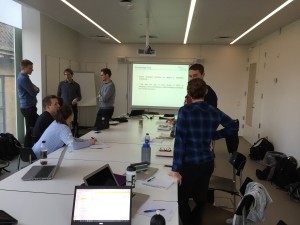
Students discuss important anti-doping topics with experts, including Dr. Nikolai Nordsborg
Agenda:
09.00- 09.15 Course introduction (Nikolai Nordsborg)
09.15 -10.00 Lecture I: Assessment of water balance (Mike Sawka)
10.00-10.45 Lecture II: Measuring total hemoglobin mass (Carsten Lundby)
11.00-12.30 Lab I: Measuring total hemoglobin mass (Christoph Siebenmann)
13.30-16.00 Symposium 1: Volume boosting & performance
13.30-14.00: Heat, plasma volume, blood volume & human performance (Mike Sawka)
14.00-14.15: Discussion (Lars Nybo)
14.15-14.45: Training, altitude & human performance (Carsten Lundby)
14.45-15.00: Discussion (Nikolai Nordsborg)
15.00-15.30: Detection of autologous blood transfusion (Jakob Mørkeberg)
15.30-16.00: General discussion
Tuesday
Today the students made a pitch for possible future anti-doping projects and we are now learning about the Athlete Biological Passport (ABP).
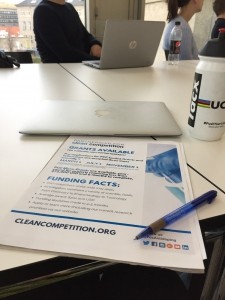
Students learned of potential funding from the PCC, including critical research priorities
Agenda:
09.00 – 12.15 Student assignment 1: Future anti-doping strategies in relation to Hb mass manipulation
09.00 – 09.10: Teaser 1: Metabolomics & proteomics (Lars Dragsted)
09.10 – 09.20: Teaser 2: Performance analyses & AI (Nikolai Nordsborg)
09.20 – 09.30: Teaser 3: Iron homeostasis (Carsten Lundby)
09.30 – 09.40: Teaser 4: Existing and future PCC projects (Mike Sawka)
10.00 – 11.00: Prepare pitch in groups of three (Students)
11.00 – 12.15: Present the pitch and discuss (Students)
13.00 – 16.00 The biological passport approach and future opportunities (Martial Saugy)
13.00-14.00: Lecture 1: The ABP hematological module (Martial Saugy)
14.00-15.00: Student interaction – ABP cases
15.00-16.00: Lecture 2: The future of the ABP approach (Martial Saugy)
Wednesday
The focus for today was the challenges of “grey-zone” drugs and legal ergogenic aids. We finished the day designing a study on the performance effects of Tramadol using real cyclists. Tomorrow we will do another test and see if we get any results!
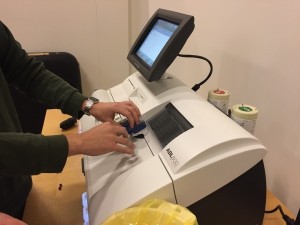
Students use an automated blood, gas, and electrolyte analyzer to measure samples from real cyclists
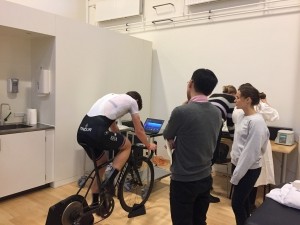
Actual cyclists were engaged to allow PhD students to perform real-world anti-doping science
Agenda:
09.00 – 09.15 Introduction: The Grey-zone (Nikolai Nordsborg)
09.15 – 09.45 Lecture 1: Legal ergogenic aids (Peter Møller Christensen)
10.00 – 10.45 Lecture 2: B2 agonists (Morten Hostrup)
11.00-11.45 Lecture 3: Tramadol (Jacob Bejder)
12.45 – 16.00 Lab exercise part I: Precise measurement of performance & manipulation of performance with grey-zone drugs
Thursday
Today we discussed testosterone and about new DBS techniques. The confounding factor associated with altitude and the blood passport was also touched on.
And the experimental results on tramadol: inconclusive with n = 1 but maybe something to explore in the future!
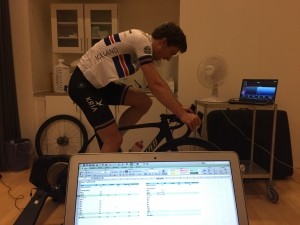
While results were inconclusive, students still benefited from a hands-on lab experience and opportunity for practice in research design and implementation
Agenda:
09.00-9.15 Introduction: Current challenges and opportunities in anti-doping (Nikolai Nordsborg)
09.15-10.00 Lecture 1: Physiological effects of testosterone in a lifespan perspective (Anders Juul)
10.15-11.00 Lecture 2: Detection of testosterone by analyses of dried blood or plasma spots (Sara Solheim)
11.15-12.00 Lecture 3: Altitude training and the Athlete Biological Passport (Nikolai Nordsborg)
12.45–14.15 Doping from an athlete’s perspective (Michael Rasmussen)
14.30-17.00 Lab exercise part II: Precise measurement of performance & manipulation of performance with grey-zone drugs
Friday
Today was the last day of the course. We had some really eye-opening talks from statistician Rasmus Bro about multivariate analysis and new statistical approaches to data analysis, a key take home point was the importance of creating good team work between statisticians and researchers. Julie Gehl also gave a fantastic insight into the possibilities of gene doping, very exciting for clinicians but a bit scary for the anti-doping community! And the day finished early so I could go and enjoy the beautiful city with all the Christmas decorations!
Agenda:
08.30-08.45 Introduction: The future of doping & anti-doping efforts (Nikolai Nordsborg)
08.45- 09.30 Lecture 1: New analytical strategies (Rasmus Bro)
09.45-10.30 Lecture 2: Genetic manipulation in treatment of disease (Julie Gehl)
10.45-11.15 Lecture 3: Genetic doping and exercise pills (Jørgen Wojtaszewski)
11.15-12.30 Student interaction: Develop the most promising project you can think of based on the last weeks input and present the idea in 3 min…
Overall the course was a fantastic overview of the diverse range of disciplines which all provide essential contributions to the prevention of doping in sports. It was a great opportunity to listen to new ideas from the students, discuss the key areas which need more research, and gain insight into the numerous new and exciting technologies available.
Thanks for the support from the PCC to attend this course! It’s given me a nice overview of the current issues in anti-doping and has also made me realize how much of an impact our current work can make.

